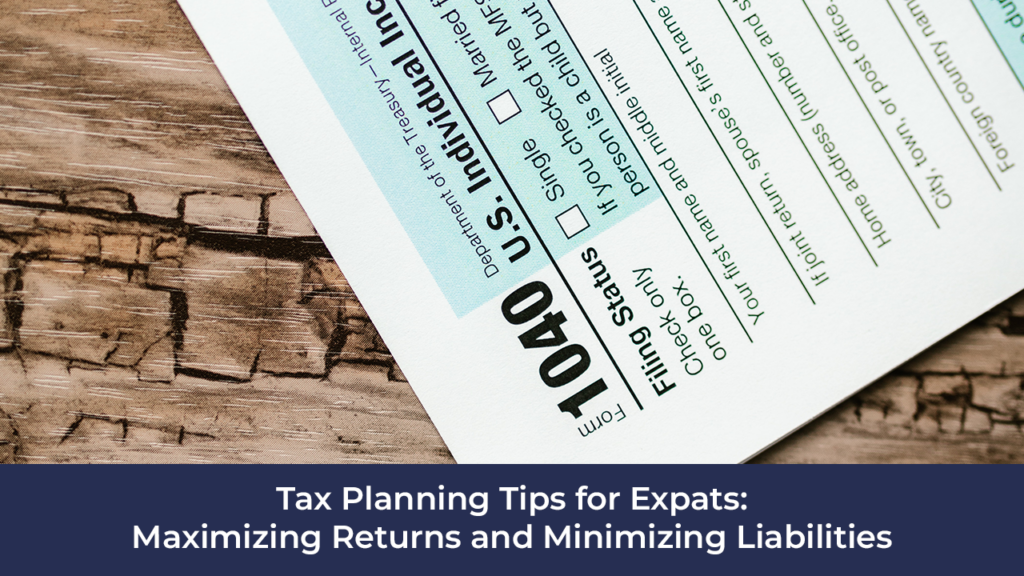Moving to a new country is an exciting adventure, but it also comes with a set of financial responsibilities, particularly when it comes to taxes. As an expatriate living in Germany, understanding the German tax system and implementing tax-efficient strategies is crucial to maximizing your investment returns while minimizing your tax liabilities. In this comprehensive guide, we will delve into the German tax system, explore the unique challenges faced by expats, and provide you with valuable tax planning tips to help you navigate the complexities and optimize your financial situation.
Understanding the German Tax System
Before diving into tax planning strategies, it’s essential to grasp the fundamentals of the German tax system, which can be quite different from the tax systems in your home country. Here are the key elements you need to know:
Residency Status
In Germany, your tax liability is determined by your residency status. If you live in Germany for more than 183 days in a calendar year or have your primary residence in the country, you are considered a tax resident. As a tax resident, your worldwide income is subject to German taxation.
Progressive Tax Rates
Germany employs a progressive tax rate system, which means that the more you earn, the higher the percentage of your income you’ll pay in taxes. Tax rates can range from 0% for low-income individuals to 45% for the highest income earners. Understanding these tax brackets is essential for planning your finances effectively.
Types of Taxes
Germany has several types of taxes that expats may encounter:
Income Tax (Einkommensteuer)
Income tax is the most significant source of revenue for the German government. It’s applied to various types of income, including wages, self-employment income, and capital gains. The tax rates vary depending on your income level.
Solidarity Surcharge (Solidaritätszuschlag)
This is an additional tax that was introduced to help fund the reconstruction of Eastern Germany after reunification. It is generally a percentage of your income tax and varies depending on your overall tax liability.
Church Tax (Kirchensteuer)
If you are a member of a recognized religious community, you may be required to pay church tax, which is typically a percentage of your income tax. Not all expats are subject to this tax, as it depends on your religious affiliation.
Value Added Tax (VAT)
VAT, known as Mehrwertsteuer in German, is a consumption tax applied to most goods and services. The standard rate is 19%, with a reduced rate of 7% for essential items like food and books.
Deductions and Allowances
Germany offers various deductions and allowances that can help reduce your taxable income. Some common deductions and allowances include those for education, childcare, health insurance, and retirement savings.
ings.
Challenges Faced by Expats in the German Tax System
Expatriates often encounter unique challenges when dealing with the German tax system. Here are some common issues and concerns expats may face:
Double Taxation
One of the primary concerns for expats is the possibility of double taxation – being taxed on the same income in both their home country and Germany. To address this issue, Germany has established tax treaties with many countries to avoid double taxation. Understanding these treaties and taking advantage of them is vital for minimizing tax liabilities.
Complex Paperwork
The German tax system can be complex and intimidating, especially for expats who may not be fluent in the language or familiar with the intricacies of the tax code. Filling out tax forms correctly and understanding your obligations can be challenging without proper guidance.
Currency Fluctuations
Expats often have financial assets in multiple currencies, which can introduce currency exchange rate risks. These fluctuations can impact the value of your investments and affect your tax liabilities. Planning for these currency fluctuations is essential.
Tax Planning Strategies for Expats in Germany
Now that we have a solid understanding of the German tax system and the challenges expats face, let’s explore some tax planning strategies to help you optimize your financial situation while living in Germany.
Determine Your Tax Residency
Understanding your tax residency status is the first step in effective tax planning. If you are unsure about your status or if you are considered a tax resident in multiple countries, seek guidance from tax professionals who specialize in international taxation.
Utilize Tax Treaties
Take advantage of tax treaties between Germany and your home country to avoid double taxation. These treaties typically outline rules for determining where your income should be taxed. Consulting a tax advisor with expertise in international taxation can help you navigate these treaties and minimize your tax burden.
Choose Tax-Efficient Investments
Investing in tax-efficient vehicles can significantly impact your overall returns. Consider investments such as tax-advantaged retirement accounts or investment funds that offer favorable tax treatment. Germany offers tax benefits for certain types of investments, so be sure to explore these options.
Maximize Deductions and Allowances
Germany provides various deductions and allowances that can reduce your taxable income. Familiarize yourself with these opportunities and ensure you claim all applicable deductions. Common deductions include those for education expenses, childcare costs, and contributions to retirement savings accounts.
Keep Detailed Records
Maintain accurate records of your income, expenses, and investments. Proper record-keeping will not only help you comply with German tax laws but also ensure that you can claim all eligible deductions and credits.
Plan for Currency Fluctuations
If you have assets in multiple currencies, consider currency risk management strategies. Hedging or diversifying your investments can help mitigate the impact of currency fluctuations on your overall financial picture.
Seek Professional Assistance
Navigating the German tax system and optimizing your financial situation as an expat can be complex. It’s advisable to seek the assistance of tax professionals who specialize in expatriate taxation. They can provide personalized advice based on your unique circumstances and ensure you are compliant with all tax regulations.
We work together with some of the best tax advisors speczialised on Expats in Germany. Reach out to us to get in touch.




